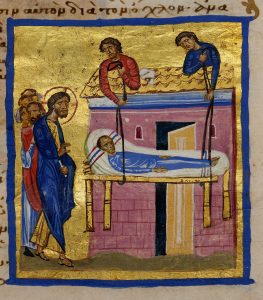 There are six Sundays in the forty day celebration of the Resurrection (corresponding to the forty days until the Ascension as recorded in the Gospel of Luke). The first three Sundays have a gospel of the Resurrection and the second three a gospel with a baptismal theme. Sadly, in our day the baptismal theme of the Feast of Pascha has sometimes been eclipsed, But Paul’s Letter to the Romans makes that connection: “Or are you unaware that we who were baptized into Christ Jesus were baptized into his death? We were indeed buried with him through baptism into death, so that, just as Christ was raised from the dead by the glory of the Father, we too might live in newness of life. (Romans 6:3-4)” This Sunday, we see this is the story of the Paralytic Man. He was without friends, paralyzed for thirty-eight years and unable to get into the pool when the angel touched the waters. However, he finds a friend in our Lord, who asks, “Do you want to be well?” This gospel affirms the sacramental mystery of baptism: it is not the water touched by an angel that cures the man, but the ultimate power of healing comes from the Lord, in the waters of baptism touched by the Holy Spirit sent by the Lord.
There are six Sundays in the forty day celebration of the Resurrection (corresponding to the forty days until the Ascension as recorded in the Gospel of Luke). The first three Sundays have a gospel of the Resurrection and the second three a gospel with a baptismal theme. Sadly, in our day the baptismal theme of the Feast of Pascha has sometimes been eclipsed, But Paul’s Letter to the Romans makes that connection: “Or are you unaware that we who were baptized into Christ Jesus were baptized into his death? We were indeed buried with him through baptism into death, so that, just as Christ was raised from the dead by the glory of the Father, we too might live in newness of life. (Romans 6:3-4)” This Sunday, we see this is the story of the Paralytic Man. He was without friends, paralyzed for thirty-eight years and unable to get into the pool when the angel touched the waters. However, he finds a friend in our Lord, who asks, “Do you want to be well?” This gospel affirms the sacramental mystery of baptism: it is not the water touched by an angel that cures the man, but the ultimate power of healing comes from the Lord, in the waters of baptism touched by the Holy Spirit sent by the Lord.
The Gospel of John is truly a proclamation of the Son of God who sends the Spirit. It also affirms the meaning of baptism, which is the rejection of evil and the commitment to Christ. “Do you want to be well?” Jesus asks, and then the healed man proclaims Jesus as his Healer. Some of the liturgical meaning is lost in some modern Bibles who relegate verse 4 about the angel touching the water to a footnote, as a passage not found in the earliest versions.
“O Christ, cure my soul as you once cured the paralytic man, for it is under the influence of evil and sin. Guide me that I may walk in your paths.” (Ode 5, Matins)
“From time to time an angel of the Lord came to stir up the waters of the pool of the Sheepgate. One man recovered his health, but now an infinite number are saved by Christ through baptism.” (Ode 4, Matins)